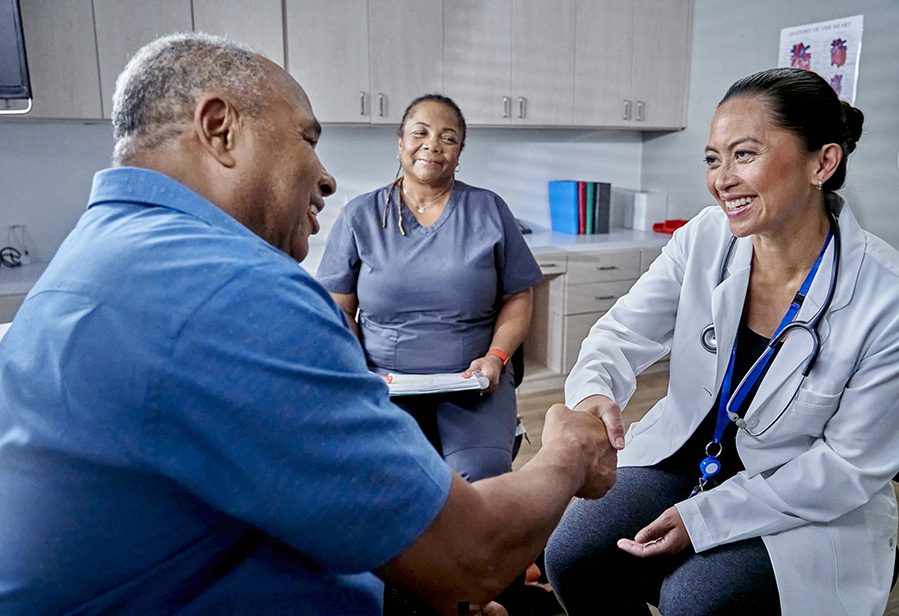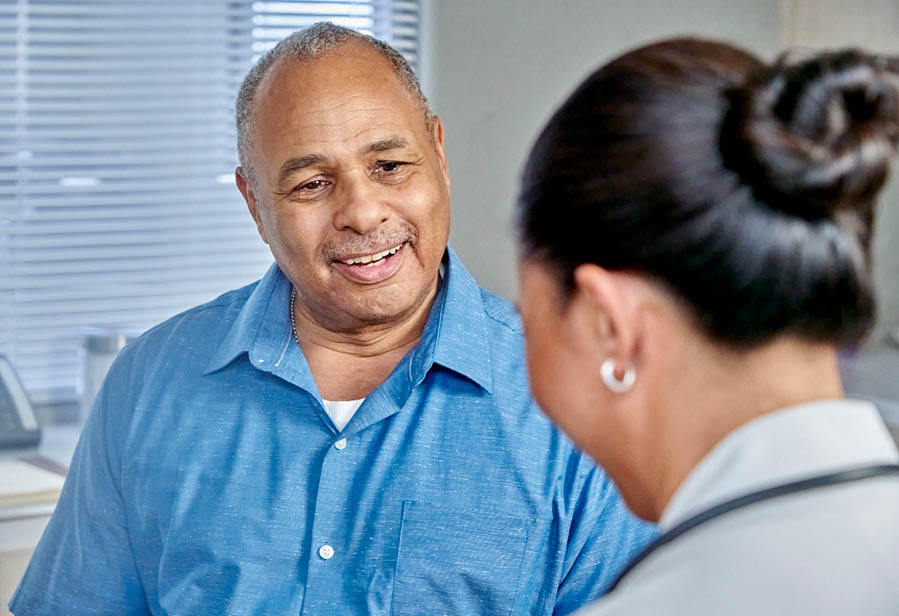The risk of sleep disordered breathing, or sleep apnea, increases with age. As this condition is more common in older adults, it can compound other risks associated with getting older. Fortunately, there are a number of effective treatments for sleep apnea. Your doctor can help you get the right diagnosis. They can also guide you through the medical interventions and home treatments that will improve your symptoms.

What is sleep apnea?
Sleep apnea is a condition where you stop breathing for short periods of time during sleep. There are different types of sleep apnea:
- Obstructive sleep apnea (OSA) is caused by a blockage in your airway, typically from the relaxing or collapsing of the back of the throat.
- Central sleep apnea is caused by a failure of the brain to send the right signals to your muscles to breathe.
- Complex sleep apnea syndrome is a combination of obstructive and central sleep apnea.
Obstructive sleep apnea is the most common form.
Sleep apnea has many serious complications. Left untreated, sleep apnea can cause:
- High blood pressure
- Heart problems
- Type 2 diabetes
- Metabolic syndrome
- Abnormal liver function or liver scarring
- Daytime drowsiness
- Irritability
- Mood swings
Since sleep apnea has the potential to cause such issues, it’s important to get diagnosed and start treatment. Fortunately, there are many ways your doctor can help relieve your sleep apnea symptoms.
How is it diagnosed?
Your doctor may recommend testing at a sleep clinic if you have symptoms of sleep apnea. Some common signs of the condition include:
- Loud snoring
- Stopped breathing or gasping for air during sleep
- Dry mouth in the morning
- Headache upon awakening
- Trouble concentrating
- Daytime fatigue
- Frequent nighttime awakenings
Your sleep partner may notice some of these signs, such as loud snoring, before you do.
Your doctor may refer you to a sleep specialist. They can monitor you overnight in a clinic, checking your breathing and body functions during sleep. This is called nocturnal polysomnography which tests:
- Activity of the lungs, heart, and brain
- Movements of the arms and legs
- Breathing patterns and blood oxygen levels
Who is at risk?
Anyone can get sleep apnea. But there are some factors that put someone at greater risk. These factors include:
- Obesity
- Age over 40
- Neck size greater than 17 inches for men or 16 inches for women
- Deviated septum
- Large tongue or narrow palate
- Retrognathia (lower jaw shorter than upper jaw)
- Allergies or sinus problems that cause nasal blockage
- Family history of sleep apnea
Even if you do not have any of these risk factors, it’s still a good idea to talk to your doctor if you have sleep apnea symptoms.
What are the types of treatments?
There are many ways to treat sleep apnea. Doctors look at what might cause your symptoms to decide what treatments to try. Here are some options:
- CPAP and other airway flow devices (BiPAP, ASV, VPAP)
- Mandibular advancement devices (MADs) to move the jaw and tongue forward
- Upper airway stimulation of the genioglossus (tongue) muscle
- Lifestyle changes (weight loss, exercise, alcohol avoidance)
- Nasal decongestants and breathing strips
- Positional therapy to encourage sleeping on the side
- Surgery on nasal passages, jaw, or uvulopalatopharyngoplasty to remodel the uvula, palate, and throat
Surgery is usually the last resort, especially in older people due to the advanced risk associated with these procedures.
What is a CPAP mask/machine?
A continuous positive airway pressure (CPAP) machine pushes air through a mask into your airway during sleep. The airway stays open and your sleep should improve.
There are different types of airway machines. These are the most common:
- CPAP (continuous positive airway pressure)
- BiPAP (bi-level positive airway pressure), where less air goes in as you breathe out
- VPAP (variable positive airway pressure), where different amounts of air go in at different stages of the breathing process
- ASV (adapto servo ventilation), where airflow adapts according to your breathing
Most people use a CPAP machine. It includes a mask to fit over your mouth, nose, or both.
How to manage sleep apnea in seniors
As people age, the occurrence of obstructive sleep apnea becomes more common. Sleep apnea in seniors is of particular concern since these individuals are at greater risk for falls. They may also experience declines in memory, attention span, and response time, all of which sleep apnea can make worse.
Many seniors benefit from a range of sleep apnea therapies, including:
- CPAP machines
- Mandibular advancement devices (MADs)
- Surgery
Often doctors recommend lifestyle changes to support the effectiveness of these therapies in seniors.
How can you manage your day-to-day lifestyle better with sleep apnea?
There are a number of steps you can take to better your overall health and support your sleep apnea treatment. They include:
- Avoid drinking. Alcohol can relax the throat muscles and exacerbate sleep apnea.
- Avoid smoking. Tobacco can cause airways to become inflamed and swell.
- Keep a healthy weight. This can reduce the risk of obstructed airways.
- Exercise. This can help with blood flow and keep your heart healthy.
- Change your sleep position. For many adults, sleeping on their side can reduce sleep apnea symptoms.
- Use a humidifier. Adding moisture to the air can prevent airway irritation from dryness and help decrease congestion.
Talk to your doctor about other ways to improve your life with sleep apnea.
What questions should you ask your provider?
When you are ready to talk to your doctor about sleep apnea, you should feel comfortable asking any questions on your mind. Here are some common ones:
- Am I at risk for sleep apnea?
- How will you test me for sleep apnea?
- Do you recommend surgery?
- Do you recommend a CPAP machine? Will I have to use it indefinitely?
- What if my symptoms improve?
- Do my medications make sleep apnea worse?
- Do my medications interfere with sleep apnea treatment?
Your doctor is your best source of information about sleep apnea and finding the right treatment for you.
Why choose a provider at Intermountain Health?
Intermountain Health offers personalized, community-based care. Our network of myGeneration clinics are specifically for seniors. We offer extra time during appointments, so you get the one-on-one consultation you need to get your questions answered. Use our Find a Provider tool today to find a doctor close to home and ready to meet with you.
*This article is for informational purposes only and is not intended to be a substitute for medical advice or diagnosis from a physician or qualified healthcare professional.





